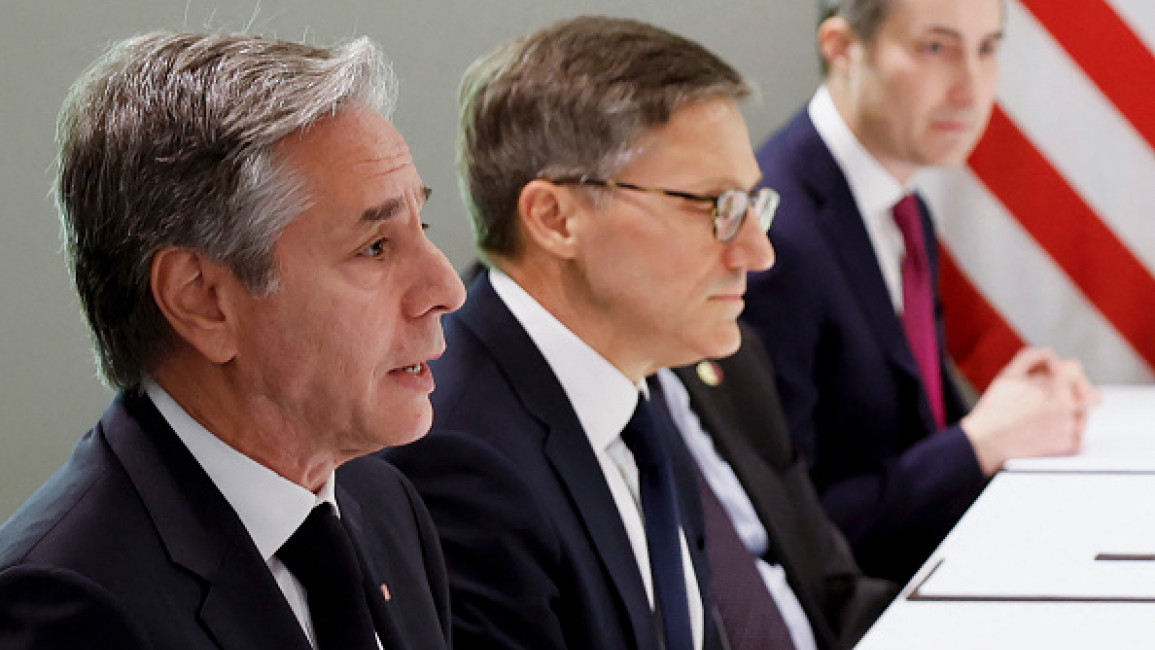Blinken urges North Gaza population return and 'reconstruction' amid Israeli opposition: report
US Secretary of State Anthony Blinken was told by Israel this week that the return of displaced Palestinians to North Gaza will not be allowed unless Hamas releases more hostages, according to reports.
During his tour of the Middle East, which began on Sunday, Blinken held a joint press conference in Doha with Qatar’s Prime Minister Sheikh Mohammed bin Jassim al-Thani where he expressed hope that Palestinian civilians will return to their homes in northern Gaza "as soon as conditions allow".
Earlier, Israeli media reported on high-level plans to expel Palestinians from Gaza. Around 85 percent of Gaza's population - amounting to around 1.9 million people - has been displaced by Israel following its war on the territory.
"They [Palestinians] cannot and they must not be pressed to leave Gaza," he added in Doha, although this message did not align with Israel's reported plans for Gaza.
Israeli officials allegedly made it clear to Blinken that such a return must be contingent on a new hostage deal, according to sources cited by Axios. Israel sees the displaced population - and their homes - as leverage for any future negotiations.
Washington hopes that the alleged Israeli transition to a "low-intensity" phase of its war on Gaza will allow displaced Palestinians to return to their homes, yet hundreds of Palestinians are still killed in air strikes daily and civilian infrastructure is routinely targeted.
Even in cases where a return to a physical home is possible, humanitarian conditions are so bad in Gaza that sustaining a civilian population would be impossible, with the UN describing conditions there as "uninhabitable".
A major factor in Biden's recent tour of the MENA region is to secure Arab and other regional support for the "reconstruction" of Gaza.
Blinken arrived in Tel Aviv claiming to have the backing of four Arab nations – namely Saudi Arabia, Jordan, Qatar and the UAE – as well as Turkey, who have allegedly pledged to reconstruct Gaza in a post-war scenario.
Those countries had previously resisted US calls for post-war planning to begin, insisting that there must be a ceasefire and a sharp reduction in civilian suffering in Gaza first.
Blinken did not offer specifics on potential contributions. Financial, logistical and in-kind support from the UAE and Saudi Arabia could be essential to the success of any plan the US might have.
Washington's top diplomat did flout the potential of Israel's "integration" into the region after its war on Gaza during a meeting with his Israeli counterpart Israel Katz. An Israeli-Saudi Arabia normalisation deal was the main focus of pre-October 7 US diplomacy in the region and it appears that this is something Tel Aviv would still like to pursue, despite the regional backlash to its indiscriminate war on Gaza.
Blinken reportedly stressed that such integration would only be possible if Israel supported the creation of a viable Palestinian state as part of its post-war planning, but this is something openly opposed by the far-right government of Benjamin Netanyahu.


![President Pezeshkian has denounced Israel's attacks on Lebanon [Getty]](/sites/default/files/styles/image_684x385/public/2173482924.jpeg?h=a5f2f23a&itok=q3evVtko)



 Follow the Middle East's top stories in English at The New Arab on Google News
Follow the Middle East's top stories in English at The New Arab on Google News


